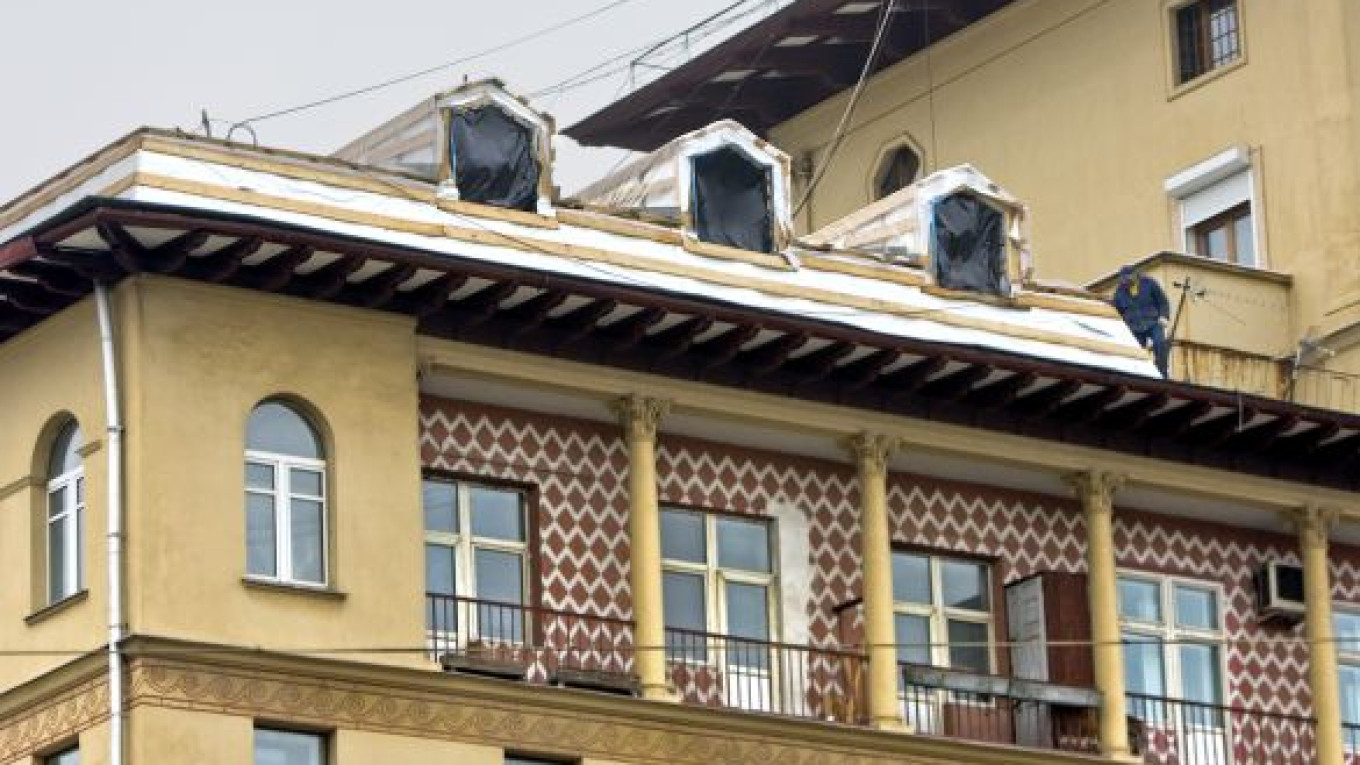As housing in Moscow gets more and more cramped, some homeowners are looking upward for extra space.
The construction of mansards, or stylized roof extensions giving room for an extra loft, has become popular among homeowners as a cheap and effective way to increase the area of their apartments.
But preservationists say mansards are being built illegally on historical landmarks, ruining the buildings’ appearances and endangering their foundations.
Eyebrows were raised after mansards appeared on two buildings in particular: one on Nikitsky Bulvar and another on Sadovaya-Sukharevskaya Ulitsa, both of which are recognized as historical landmarks and therefore protected by law from any construction work that changes their historical appearance.
A mansard is being constructed on the left wing of the House of Polar Explorers on Nikitsky Bulvar, which was built in Italian Renaissance style in 1937 and is considered a historical landmark.
“Construction of the mansard is bearing down on the foundation of the house, which causes the foundation to warp. As a result, cracks may start appearing on the front of the building,” said Natalya Samover, a preservationist with Arkhnadzor, a group seeking to protect old buildings in central Moscow.
“Whoever started the construction on the House of Polar Explorers definitely knew that it was a cultural landmark, as there was a tablet on the front of the building,” she said.
Nevertheless, building a mansard is an attractive option for homeowners, who can use it to increase the size of their apartment for a fraction of the price.
“It’s a third to two-thirds cheaper to build a mansard over your current top-floor apartment than to buy a two-floor apartment,” said Natalya Levitova, a senior adviser at Evans real estate agency.
A mansard can be built quickly, as it doesn’t require any additional engineering equipment, but there are also many problems in receiving permission, said Maria Litinetskaya, executive director real estate agency Blackwood.
Other homeowners are more interested in a building with a mansard because they want the special atmosphere that comes with living directly under the roof.
Another building on which a mansard is being illegally constructed is the Pravdina Mansion, Arkhnadzor said.
Pravdina Mansion, built in 1908 on Sadovaya-Sukharevskaya Ulitsa, is currently an office for the Interior Ministry’s internal security directorate, a service that investigates law enforcement violations.
“The Pravdina Mansion is the last historical house in the district of Samotyoka, and until recently it had preserved its original appearance,” Arkhnadzor said in a statement.
The Interior Ministry department built a mansard on the roof of the building in order to provide its employees with additional space, said an official from the internal security directorate who declined to give his name because he wasn’t authorized to speak to the media.
“A mansard is not major construction work, and if it’s being built that means we have all the necessary documents and permits,” he said.
Under current legislation, any major construction on a historical landmark is forbidden, Samover said. It doesn’t matter whether they were able to get construction permits, it’s still a violation of the law.
The ministry official dismissed concerns that the mansard’s construction was altering a historical landmark. “That’s ridiculous. Do you think we all should live in tents?” he said.
Arkhnadzor filed a complaint with the Moscow Cultural Heritage Committee, the city’s architectural watchdog, but no investigation has been opened.
A spokeswoman for the committee told The Moscow Times that it had received the complaint and that an inspection would be made within a month.
The Interior Ministry declined to provide an official statement.
If the Moscow Cultural Heritage Committee doesn’t move to stop the illegal mansard construction on Nikitsky Bulvar and Sadovaya-Sukharevskaya Ulitsa, Samover said Arkhnadzor would file a claim to the Moscow prosecutor’s office.
A Message from The Moscow Times:
Dear readers,
We are facing unprecedented challenges. Russia's Prosecutor General's Office has designated The Moscow Times as an "undesirable" organization, criminalizing our work and putting our staff at risk of prosecution. This follows our earlier unjust labeling as a "foreign agent."
These actions are direct attempts to silence independent journalism in Russia. The authorities claim our work "discredits the decisions of the Russian leadership." We see things differently: we strive to provide accurate, unbiased reporting on Russia.
We, the journalists of The Moscow Times, refuse to be silenced. But to continue our work, we need your help.
Your support, no matter how small, makes a world of difference. If you can, please support us monthly starting from just $2. It's quick to set up, and every contribution makes a significant impact.
By supporting The Moscow Times, you're defending open, independent journalism in the face of repression. Thank you for standing with us.
Remind me later.


